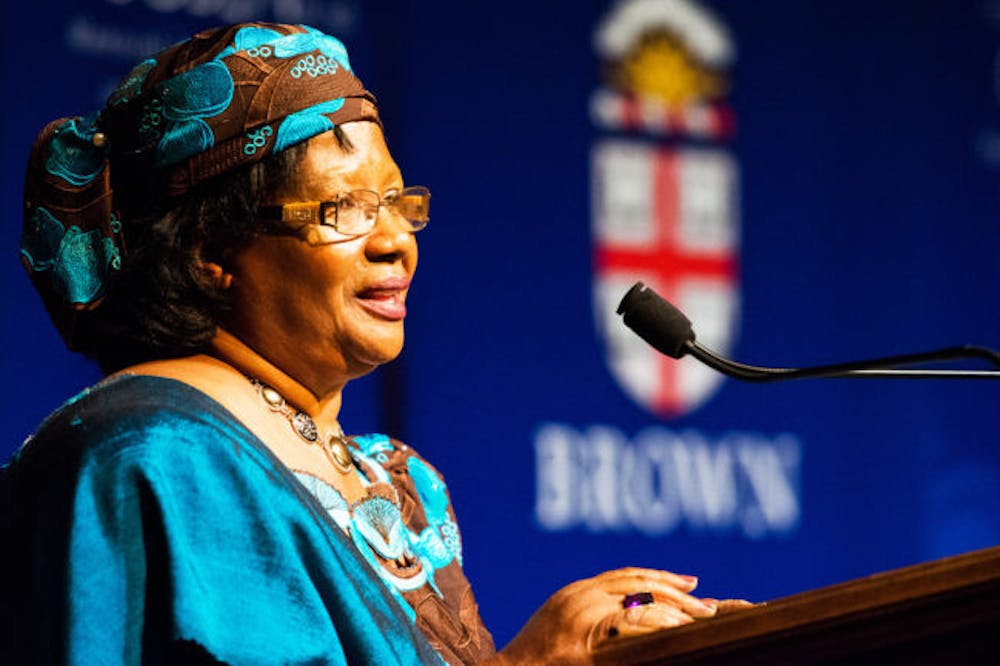On a rainy Monday evening, Her Excellency Joyce Banda, president of Malawi from 2012 to 2014, delivered the 93rd Stephen A. Ogden Jr. ’60 Memorial Lecture on International Affairs to a crowded DeCiccio Family Auditorium. Banda’s lecture, titled “Moral Leadership: The Prerequisite for Economic Growth, Development and Peace in Africa,” was a resounding call for a new ethos of governance across Africa and the world.
Banda anchored her analysis in personal experience. She described herself as a “typical African woman who has also had (the) privilege of serving (her) people as head of state.” She said that while serving as president of Malawi, her focus was always on helping the people. “For me, leadership is a love affair: You fall in love with the people, and the people must fall in love with you,” she said. “I have learned that when you engage the people, they will stand with you and by you,” she added.
At the core of Banda’s lecture was the notion of moral governance. In a conversation with The Herald, Banda said, “What Africa needs — what the world needs — is moral leadership.” She described a moral leader as someone who “focuses on how they can best serve the people that give them the mandate. Moral leadership means acknowledging the fact that, one, you serve the people, but also recognizing that you serve at their pleasure.”
“The people come first,” she added.
Banda argued that moral leadership is composed of three main pillars: good governance; accountability and transparency; and inclusivity. Good governance is defined by ethical leadership and respect for human rights and civil liberties. Transparency and accountability, Banda said, “have direct bearing on economic development, growth, peace and unity.”
Inclusivity can end divisions and foster national unity, Banda said. She added that when she took office, Malawi was polarized by tribalism, regionalism, cronyism and nepotism. Most government offices were run by a single tribe. By establishing an inclusive government and seeing that all were represented across government, Banda said that she was able to heal divides and unify the Malawian people.
She also tied some of her initiatives as president — for which she continues to advocate — to personal experience. Banda’s mission to “build as many schools as possible, send as many girls to school as possible” has in large part been motivated by her close childhood friend, a very bright student who dropped out of one of the nation’s best secondary schools because she was unable to raise the tuition of six pounds.
As president, Banda, who almost died giving birth, also placed great emphasis on lowering infant and maternal mortality rates. She spoke about the difficulty she faced leaving an abusive marriage, an action that was extremely uncommon in Malawi, and her following efforts to empower women and promote female leadership.
Banda also focused on the fight against corruption. “I feel very proud that on the continent of Africa now, there’s a whole crop of leaders that are saying ‘no’ to corruption, that are observing good governance and the rule of law, that are accountable and transparent and that are inclusive,” she told The Herald. She held up Tanzania, Ghana and Botswana as examples of countries leading Africa into an era of moral leadership and noted that moral leadership in these countries has allowed for great economic growth.
But this is not the case for many African nations.“Lack of moral leadership remains a missing link in Africa’s development trajectory,” Banda said. “It is the genesis of underdevelopment.” Banda added that it “doesn’t make sense that Botswana has diamonds and is prospering” while some of its neighbors with the same natural resources have very low standards of living.
“The current state of affairs in most African countries is simply not acceptable,” Banda said. “People of Africa expect governments to change their situations because governments simply have that obligation. The people of Africa know how much wealth God has given them, and they want that wealth to benefit them.” She said that the first cry for freedom among Africans was from colonial rule, and the second was from military dictatorships. The call is now for freedom from corruption and the poverty it causes.
Citing the Panama Papers, Banda said, “The issue of corruption is now a global problem, and we must fight it together — the developed world and the developing world. … I ask the Western world not to be the enablers” by turning a blind eye to ill-gotten money coming into their countries.
Banda argued that good governance is the key to development. She said, “what Africa really needs is not aid but trade.” She noted, “it is only when people are free to open businesses and make money that we will be able to realize economic growth.”
Malawi is currently the recipient of foreign aid, and while Banda said that Malawi may not need foreign aid after a few years, it is important now. She praised U.S. government programs that provide nutrition and support education and civil society. She added that it is imperative that development organizations form “smart partnerships” with local non-governmental organizations in order to realize meaningful and effective development.
“I worry about those international NGOs and other people who come to Africa and think they can do (development) for us. Being poor is not being stupid. We know exactly what we should do to change our situation,” Banda told The Herald. She urged students in America to “get to know Africa” through in-depth study.
Daniel Smith, professor of anthropology and chair of the department, said that Banda “has a long history of working in a lot of areas that Brown cares about: women’s rights, reproductive health, development, social change.” He noted that her lecture coincided with this year’s launch of the Watson Institute Africa Initiative. “The new Africa Initiative is eager to have the whole Brown community, especially undergraduates, get involved,” he added.





